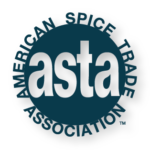ASTA submits comments on issues related to the spice industry when legislative bodies or regulatory bodies request public comment and/or when an issue arises that warrants comment.
| FDA Funding – Passage of the Food Safety Modernization Act (FSMA), the most sweeping reform of food safety legislation in modern times, greatly expanded the U.S. Food and Drug Administration’s authority to ensure the food supply in the United States is safe. FSMA covers domestically grown and produced food as well as food and ingredients imported from abroad. ASTA understands that appropriate resources are needed for FDA to carry out its Congressionally-mandated mission and has expressed support through comments for adequate funding levels for FDA. |
| Draft Risk Profile – Following several food borne illness outbreaks attributed to spices, FDA began work on a Risk Profile on Pathogens and Filth in Spices and the draft was published in October, 2013. ASTA hired a consultant to conduct a scientific evaluation of the draft risk profile. That evaluation as well as significant comments were submitted to FDA. |
| Food Safety Legislation – Prior to passage of FSMA, ASTA submitted comments to Congress on pending food safety legislation as it was being deliberated in Congress. |
|
| Food Safety Issues – Other – ASTA has submitted comments on a wide range of issues concerning the safety of the food supply and trade issues involving duties on spice products. |
|
| Food Labeling – ASTA has submitted comments on a variety of issues related to the appropriate labeling of foods to ensure standardization, to ensure that labels are truthful and not misleading to consumers and ensure that labeling policy is based on sound scientific principles. |
|
| Dietary Guidelines for Americans – Every five years the U.S government is charged with reviewing federal nutrition guidelines that serve as the foundation for food policy in the U.S. to make sure that these policies are based on the latest science. ASTA has submitted comments to the Dietary Guidelines Advisory Committee on the important role that spices can serve in enhancing the consumption of nutrient dense foods. |
| Generalized System of Preferences (GSP) Trade Program – The Generalized System of Preferences (GSP) program that expired on July 13, 2013 gave preferential tariff treatment to certain products imported from designated beneficiary developing countries (BDCs) in order to promote economic growth by stimulating exports. The U.S. program, subject to periodicrenewal by Congress, was last extended through July 31, 2013. Renewal of the GSP program has been somewhat controversial in recent years and it is not known whether it will be extended at a later date. ASTA has submitted comments to Congress on the importance of extending GSP in previous years. |
| The Lacey Act – The Lacey Act is a law intended to protect endangered species by prohibiting trade that has been illegally taken, possessed, transported or sold. ASTA has submitted comments to the U.S. Department of Agriculture urging a technical change to the definition of “common food crop” to ensure that wild grown and harvested spices are included among the products exempted from this trade prohibition. |
| ASTA Hill Advocacy – When issues with the potential to impact the spice industry are being considered by Congress ASTA lends a voice in the deliberations. |




